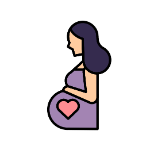
Pregnancy Wellness During Ramadan
Are You Pregnant And Fasting During Ramadan? We Have Got Some Tips For You That You Need To Know!
6 min | Updated on 11-04-2022 by HappyPreggie
Pregnancy is such a fantastic time to eat all of your favorite, nutritious meals throughout the day, isn't it? We know you're enjoying this wonderful moment in your life, but we also know you might be fasting during Ramadan. Pregnant women who choose to fast throughout Ramadan may find it difficult to fulfill their bodies' nutritional and hydration needs.

(Image credits to Canva)
The major focus on nutrition throughout pregnancy must be constant in order to guarantee the baby's safe and healthy growth, which might have a significant impact on the child's health later in life. Read the whole article below to get the tips that will help you out during Ramadan to maintain good health for both you and your baby. We would also recommend you to talk to your gynecologist beforehand.
This is still an important question, and we don't know for sure if fasting during pregnancy is healthy for both you and your kid. Most medical professionals, however, suggest avoiding fasting while pregnant. Fasting, according to doctors, may raise the risk of dehydration if Ramadan comes during the summer. This might influence your baby's growth by affecting the way your kidneys work and the quantity of fluid that surrounds him or her.

(Image credits to Canva)
As a result, the influence of fasting during pregnancy is determined by the mother's overall health, the pregnancy week, and the Ramadan season. Without extensive study, determining the impact of fasting during pregnancy on your health and the development of your baby is challenging. As a precaution, it's essential to talk to your doctor before going on a fast.
A pregnant woman in perfect health can fast without risk of harming herself or the baby's development, but it's always a good idea to consult with the doctor first. Worrying about one's health during pregnancy is a reasonable cause to seek the advice of a gynecologist and take precautions to avoid situations that might jeopardize her health or the health of the unborn.

(Image credits to Canva)
Fasting is often refraining for pregnant women who have difficulties such as high blood pressure, diabetes, kidney infections, or heart conditions. It is crucial to notify the gynecologist about the desire to fast despite bad health circumstances during pregnancy so that they may provide appropriate guidance and do any necessary health tests on a regular basis.
If you've decided to fast while pregnant, you're probably wondering how to do it properly. We have five recommendations for you to safely fast while safeguarding yourself and your baby.
To have better sleep in the morning, some people may consider foregoing the Ramadan pre-dawn meal, commonly known as sahoor. However, missing this breakfast may cause you to feel sluggish for the rest of the day due to a lack of energy. You will have more energy if you consume the nutrients included in sahoor than if you choose to sleep in. To avoid weakness and dehydration until you can break your fast for the day, make sure you eat enough throughout sahoor.

(Image credits to Canva)
During pregnancy, dehydration is a serious concern to be aware of. Pregnant women require more water than the usual person because water is required to build the placenta, which provides nutrition to the growing baby. Inadequate hydration can result in insufficient amniotic fluid, inadequate breast milk supply, and even early labor. You may not be consuming enough fluids if you have a dry mouth, headaches, or dark yellow urine.

(Image credits to Canva)
Drink plenty of water before your pre-dawn meal (sahoor) and after you've broken your fast for the day (iftar). It's also a good idea to eat meals that are high in water, such as fresh fruits and vegetables, to stay hydrated. Salty meals should be avoided since they might make you thirsty.
To ensure that you and your baby get adequate nutrients, you must eat a well-balanced diet. Make sure your sahoor and iftar meals are well-balanced in terms of carbs, protein, vitamins, and fiber. Because complex carbs release energy more slowly, eating more of them will make you feel less hungry. Brown rice, wholemeal bread, and pasta are examples of complex carbs. You may get the nutrients you need to keep healthy throughout Ramadan by eating lean protein and healthy fats from foods like almonds and olive oil.

(Image credits to Canva)
You don't have to consume a lot of food during iftar because overeating might cause your body to get stressed. Overeating can cause indigestion and weight gain, especially if you consume a lot of sugary and salty meals. You should only consume as much food as you require to feel satisfied. This will keep you from gaining weight or feeling bloated after meals.
To save energy during Ramadan, it's tempting to stay in bed for the most of the day. Avoiding exercise altogether, on the other hand, might make you feel sluggish. Maintaining a healthy level of activity through moderate exercise will help you stay energized throughout the day and lower your chances of back discomfort, constipation, and excessive weight gain while pregnant. Brisk walking, swimming, and modified yoga or Pilates are all simple workouts that you may undertake while pregnant. These exercises should be done around an hour before sahoor.

(Image credits to Canva)
We hope that this blog has given you a better understanding of the risks of fasting while pregnant and how to fast safely during Ramadan. To be on the safe side, always see a doctor if you are unsure whether or not you should fast. HappyPreggie would like to extend our best wishes to all of our Muslim readers and providers. Ramadan Kareem.
If you loved reading this article we would also like to suggest you to read- 10 Ways To Take Care Of Your Mental Health During Pregnancy or you can also read- Top 7 Pregnancy Safe Skincare Brands In Malaysia That Mummies Need To Have In 2022.
(Image credits to Canva)
The major focus on nutrition throughout pregnancy must be constant in order to guarantee the baby's safe and healthy growth, which might have a significant impact on the child's health later in life. Read the whole article below to get the tips that will help you out during Ramadan to maintain good health for both you and your baby. We would also recommend you to talk to your gynecologist beforehand.
Is it okay to fast when pregnant?
This is still an important question, and we don't know for sure if fasting during pregnancy is healthy for both you and your kid. Most medical professionals, however, suggest avoiding fasting while pregnant. Fasting, according to doctors, may raise the risk of dehydration if Ramadan comes during the summer. This might influence your baby's growth by affecting the way your kidneys work and the quantity of fluid that surrounds him or her.
(Image credits to Canva)
As a result, the influence of fasting during pregnancy is determined by the mother's overall health, the pregnancy week, and the Ramadan season. Without extensive study, determining the impact of fasting during pregnancy on your health and the development of your baby is challenging. As a precaution, it's essential to talk to your doctor before going on a fast.
Fasting during pregnancy: Discuss with your gynecologist
A pregnant woman in perfect health can fast without risk of harming herself or the baby's development, but it's always a good idea to consult with the doctor first. Worrying about one's health during pregnancy is a reasonable cause to seek the advice of a gynecologist and take precautions to avoid situations that might jeopardize her health or the health of the unborn.
(Image credits to Canva)
Fasting is often refraining for pregnant women who have difficulties such as high blood pressure, diabetes, kidney infections, or heart conditions. It is crucial to notify the gynecologist about the desire to fast despite bad health circumstances during pregnancy so that they may provide appropriate guidance and do any necessary health tests on a regular basis.
Tips to Fast Safely During Pregnancy
If you've decided to fast while pregnant, you're probably wondering how to do it properly. We have five recommendations for you to safely fast while safeguarding yourself and your baby.
#1 Do not miss the Sahoor
To have better sleep in the morning, some people may consider foregoing the Ramadan pre-dawn meal, commonly known as sahoor. However, missing this breakfast may cause you to feel sluggish for the rest of the day due to a lack of energy. You will have more energy if you consume the nutrients included in sahoor than if you choose to sleep in. To avoid weakness and dehydration until you can break your fast for the day, make sure you eat enough throughout sahoor.
(Image credits to Canva)
#2 Keep yourself hydrated
During pregnancy, dehydration is a serious concern to be aware of. Pregnant women require more water than the usual person because water is required to build the placenta, which provides nutrition to the growing baby. Inadequate hydration can result in insufficient amniotic fluid, inadequate breast milk supply, and even early labor. You may not be consuming enough fluids if you have a dry mouth, headaches, or dark yellow urine.
(Image credits to Canva)
Drink plenty of water before your pre-dawn meal (sahoor) and after you've broken your fast for the day (iftar). It's also a good idea to eat meals that are high in water, such as fresh fruits and vegetables, to stay hydrated. Salty meals should be avoided since they might make you thirsty.
#3 Maintain a balanced diet
To ensure that you and your baby get adequate nutrients, you must eat a well-balanced diet. Make sure your sahoor and iftar meals are well-balanced in terms of carbs, protein, vitamins, and fiber. Because complex carbs release energy more slowly, eating more of them will make you feel less hungry. Brown rice, wholemeal bread, and pasta are examples of complex carbs. You may get the nutrients you need to keep healthy throughout Ramadan by eating lean protein and healthy fats from foods like almonds and olive oil.
(Image credits to Canva)
#4 Keep your portion sizes in check
You don't have to consume a lot of food during iftar because overeating might cause your body to get stressed. Overeating can cause indigestion and weight gain, especially if you consume a lot of sugary and salty meals. You should only consume as much food as you require to feel satisfied. This will keep you from gaining weight or feeling bloated after meals.
#5 Stay active
To save energy during Ramadan, it's tempting to stay in bed for the most of the day. Avoiding exercise altogether, on the other hand, might make you feel sluggish. Maintaining a healthy level of activity through moderate exercise will help you stay energized throughout the day and lower your chances of back discomfort, constipation, and excessive weight gain while pregnant. Brisk walking, swimming, and modified yoga or Pilates are all simple workouts that you may undertake while pregnant. These exercises should be done around an hour before sahoor.
(Image credits to Canva)
How to make fasting easier during pregnancy
- Maintain a plan and schedule your days so that you may rest during fasting. This is especially vital if you work as a professional and put in long hours.
- Maintain a calm demeanor and avoid emotional stress. Stress can be caused by changes in your schedule, a shortage of food and water, and eating and drinking at various times. The stress hormone cortical was found to be greater in the blood of pregnant women who fasted during Ramzan than those who did not fast.
- Keep cool to avoid being dehydrated, which is harmful to both you and your baby.
- Avoid walking long distances or carrying heavy items. Reduce the amount of housekeeping you perform and anything else that makes you tired.
- Relax for a while after dinner, then get up and exercise about before retiring for the night.
- Before going to bed, avoid snacking late in the evening. As you prepare for another day of fasting, make sure to take your Suhoor the next morning.
- If you're sick, don't push yourself too hard. Keep an eye out for these pregnancy symptoms that should be addressed by a doctor.
We hope that this blog has given you a better understanding of the risks of fasting while pregnant and how to fast safely during Ramadan. To be on the safe side, always see a doctor if you are unsure whether or not you should fast. HappyPreggie would like to extend our best wishes to all of our Muslim readers and providers. Ramadan Kareem.
If you loved reading this article we would also like to suggest you to read- 10 Ways To Take Care Of Your Mental Health During Pregnancy or you can also read- Top 7 Pregnancy Safe Skincare Brands In Malaysia That Mummies Need To Have In 2022.
Join the largest support network for family health and well-being. Ready to get started?
Get started
















